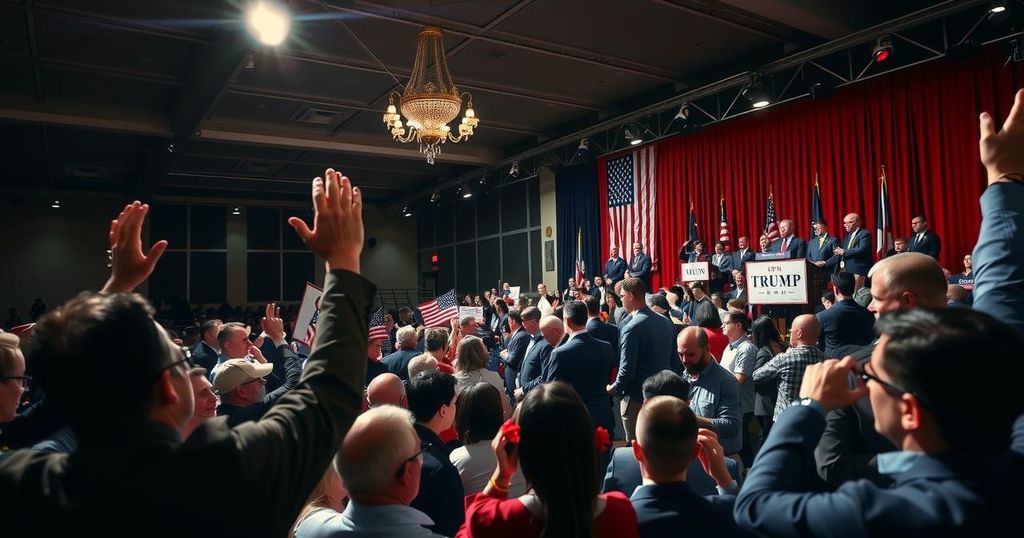Election 2024: Trump Works McDonald’s, Harris Engages Churches in Georgia
In a notable campaign move, Donald Trump briefly worked at a McDonald’s in Pennsylvania, reiterating claims about Kamala Harris’s employment history there. Meanwhile, Harris focused her energy on rallying Black voters in Georgia through church visits and community events, highlighting themes of faith and empowerment. The contrasting strategies suggest a highly competitive political environment as both candidates prepare for the upcoming election.
In a highly publicized event, former President Donald Trump visited a McDonald’s in Feasterville, Pennsylvania, where he briefly worked at the fry station. This visit was part of his ongoing campaign rhetoric, as he reiterated an unfounded claim suggesting that Vice President Kamala Harris never worked at a McDonald’s, despite her history working there during her summer as a college student. Meanwhile, Vice President Harris focused her efforts on mobilizing voters in Georgia, making appearances at Black churches, including a significant stop at New Birth Missionary Baptist Church, where she emphasized themes of faith and community engagement. During Trump’s visit, he donned an apron, prepared French fries, and engaged with supporters, confidently stating, “I’ll never forget this experience,” reflecting on his time at the popular fast-food chain. This event attracted attention from a crowd of onlookers, some of whom expressed support for Trump’s presidential bid in 2024. Later, he acknowledged Harris’s birthday in a somewhat conciliatory gesture, wishing her well on her milestone. From Georgia, Kamala Harris aimed to galvanize the Black electorate, conducting “Souls to the Polls” events to encourage early voting. At Divine Faith Ministries International, her efforts were marred by a racially charged incident involving a passerby who shouted obscenities at congregation members. Despite this, Senators like Raphael Warnock urged Black men to vote for the Democratic candidate and reject Trump as an option, citing concerns about voter turnout among this demographic. Amid these developments, high-profile politicians and former Trump officials accused each other of political opportunism, with Harris calling attention to social issues, including abortion rights and economic empowerment for Black men. Meanwhile, Trump remained focused on energizing his base and addressing his campaign’s narrative about Harris’s past. As the election approaches, the political landscape grows tense, with both campaigns intensifying their outreach efforts and addressing various social issues that resonate with voters in critical swing states. This political theater underscores the growing stakes of the 2024 election, as candidates attempt to forge connections with constituents amid divisive rhetoric.
The 2024 election is shaping up to be one of the most contested in recent history, with key focus areas revolving around voter mobilization and engagement, especially among minority groups. As the election date approaches, both major party candidates—former President Donald Trump and Vice President Kamala Harris—are ramping up their campaigns, with Trump leveraging his past presidency and Harris emphasizing her connection to the Black community through faith and policy. The political climate is further charged by public comments and actions that attract both support and criticism, reflecting the polarized state of American politics. The current election cycle also sees significant emphasis on early voting and the mobilization of key demographics to ensure their participation in the electoral process.
In conclusion, the recent activities of Donald Trump and Kamala Harris highlight the contrasting strategies being employed as the 2024 election approaches. Trump’s visit to McDonald’s served to both energize his supporters and confront narratives surrounding Harris’s past, while Harris’s outreach to Black churches in Georgia underlines her campaign’s commitment to social issues and voter engagement. Both candidates face immense pressure to solidify their base and appeal to undecided voters, especially in pivotal swing states that will play a crucial role in determining the election’s outcome.
Original Source: www.washingtonpost.com




Post Comment